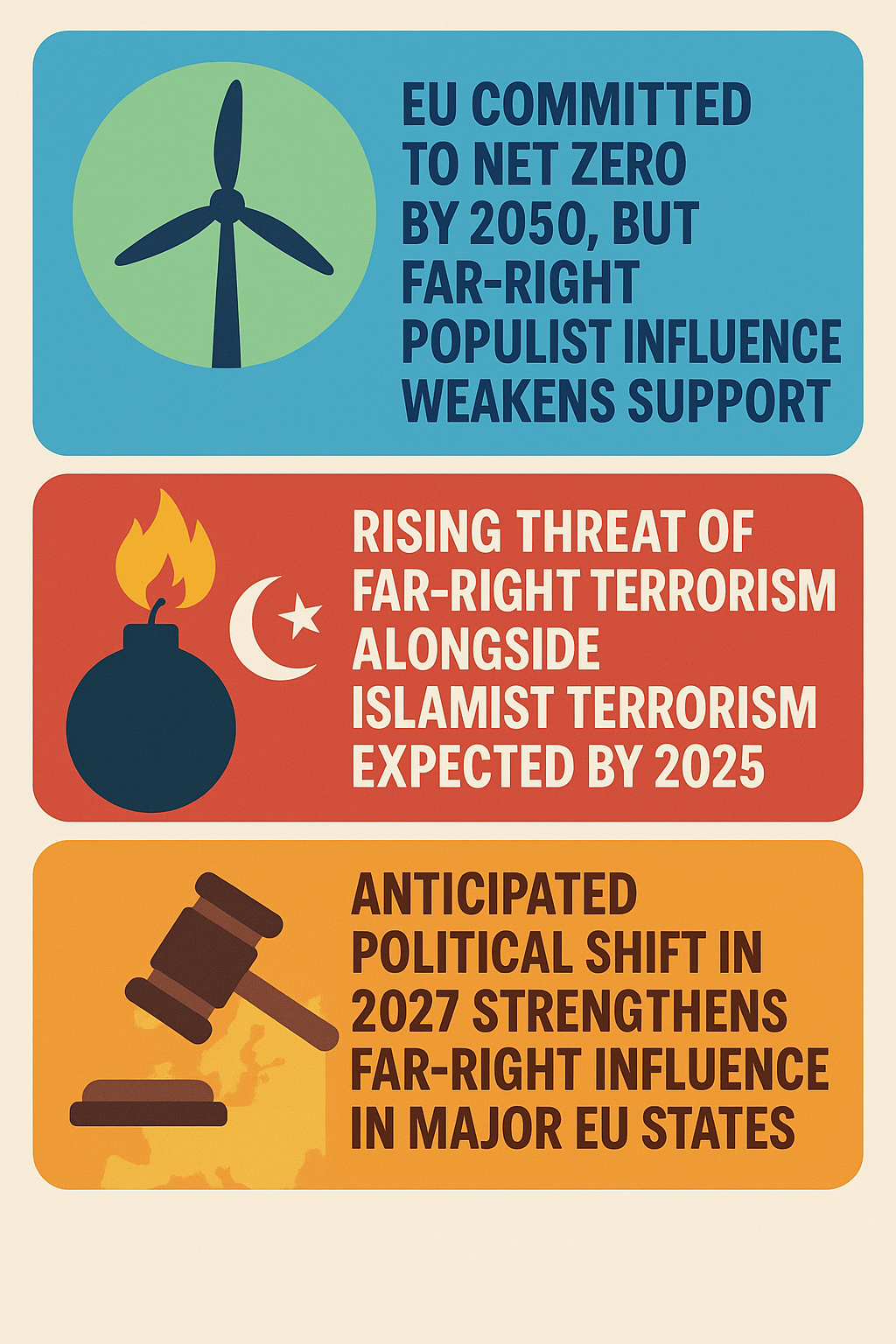Global Scans · Rise of the far right · Signal Scanner
Emerging Political Fragmentation in Europe: A Weak Signal with Broad Implications
Europe is on the cusp of potentially significant political shifts that may disrupt economic, social, and geopolitical landscapes over the next decade. The rise of far-right populism and Euroscepticism, especially evident in recent electoral patterns and public sentiment, signals a weak but growing trend of political fragmentation. This trend could unsettle traditional alliances, financial markets, and governance models, posing challenges for long-term strategic planning across multiple sectors.
What's Changing?
Recent and upcoming elections, notably the European Parliament elections scheduled for June 2024, have amplified concerns about a possible surge in far-right populist parties and Eurosceptic forces within Europe (Le Monde, 2024). These political currents are more than mere electoral noise; they reflect deeper societal dissatisfaction with globalization, immigration policies, economic austerity measures, and the perceived dilution of national sovereignty.
In France, for instance, the far-right National Rally, led by Marine Le Pen, is gaining traction in the parliamentary elections. This rise coincides with larger political tremors impacting financial markets and public debt perceptions. Financial analysts warn that increased influence of far-right elements could compound France’s public debt challenges by instigating uncertainty over fiscal discipline and governance stability (Politico, 2024).
This situation is not isolated to France but resonates across several EU member states where Eurosceptic parties leverage economic anxieties and cultural fears to build electoral momentum. These parties frequently critique EU institutions, calling for reduced integration, renegotiation of treaties, or even withdrawal from the Union.
Furthermore, the timing – a record election year globally – adds complexity, with multiple major democracies experiencing political volatility simultaneously (Le Monde, 2024). This simultaneity may intensify cross-border contagion effects, where gains by far-right populists in one country embolden their counterparts in others.
The dynamic is also evolving in the public discourse and social media ecosystems, where misinformation and identity-driven narratives increasingly influence political allegiance and decision-making processes. These factors reinforce polarization and could accelerate shifts away from centrist political norms.
Why is this Important?
The rise of populist, nationalist, and Eurosceptic forces carries substantial implications for regional stability and international cooperation. Economically, markets with high exposure to Eurozone debt may experience increased volatility as investors question the cohesion and future direction of the EU. This could prompt higher borrowing costs, reduced investment, and strained fiscal policies in member states.
Politically, fragmentation within the European Parliament and national legislatures could hinder collective action on critical issues such as climate change, digital innovation regulations, defense cooperation, and migration management. Such gridlock could delay or dilute reforms necessary to maintain Europe’s competitive position globally.
For governments, this uncertainty complicates strategic intelligence and horizon scanning efforts. Anticipating policy shifts becomes more challenging, requiring agile scenario planning that accounts for rapid changes in the political landscape and their ripple effects on regulatory environments and public-private partnerships.
Societally, the trend risks heightening divisions between urban and rural populations, economic classes, and generations. This fragmentation could reduce social cohesion, impacting labor markets, education systems, and public trust in institutions. The rise of far-right narratives may also escalate social tensions, with potential consequences for security and community resilience.
Implications
The emerging political fragmentation represents a multi-sectoral disruptor likely to influence:
- Financial markets: Increased risk premiums on Eurozone debt and greater currency volatility may affect multinational corporations and government debt management.
- European Union governance: Potential policy paralysis or shifts towards protectionism could reduce the EU’s global influence and disrupt cross-border trade and regulatory harmonization.
- Business strategy: Companies may face unpredictable regulatory environments, requiring enhanced regulatory risk monitoring and flexible operational models.
- International relations: Strained cooperation among EU member states might affect NATO coordination, trade negotiations, and responses to geopolitical threats.
- Social infrastructure: Increased polarization stands to challenge efforts to build inclusive societies and could necessitate renewed investment in community engagement and cohesion programs.
Strategic planners should integrate this weak signal by expanding scenario development to include political fragmentation and its cascading impacts. Monitoring electoral trends, public sentiment data, and social media narratives will be essential to anticipate tipping points.
Governments and businesses might explore multi-stakeholder dialogues to bridge divides and build resilience. Preparing contingency plans for a range of political outcomes, from moderate realignments to more radical disruptions, will improve adaptive capacity.
Questions
- How might the rise of far-right populism in Europe alter regulatory frameworks impacting your industry in the next 5 to 10 years?
- What mechanisms do your strategic intelligence processes have in place to identify early signals of political fragmentation and societal polarization?
- Could increased fiscal uncertainty in core EU economies affect your organization's financing or investment plans, and how might you mitigate such risks?
- What role can your organization play in fostering social cohesion and countering divisive narratives within your stakeholder communities?
- How would potential EU policy gridlocks impact cross-border supply chains and international business operations relevant to your sector?
Keywords
far-right populism; Euroscepticism; European Parliament elections; political fragmentation; financial markets volatility; regulatory risk; social polarization
Bibliography
- Suspense is brewing in Europe, where elections to the European Parliament in June could lead to a surge in far-right populism and Euroscepticism. Le Monde. https://www.lemonde.fr/en/international/article/2024/01/07/us-brazil-mexico-india-2024-will-be-a-record-election-year_6410437_4.html
- The rise of the far right is sending tremors through financial markets and could push French debt deeper into the danger zone. Politico. https://www.politico.eu/article/european-election-french-parliamentary-elections-emmanuel-macron-france-economy-austerity-debt-marine-le-pen-national-rally/
